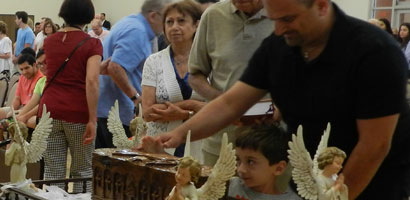 BELMONT — Bishop Peter Jugis told more than 100 young men on the Quo Vadis Days-Diocese of Charlotte retreat today at Mass at Belmont Abbey College that "God is the goal of your life. God is the focus of your life."
BELMONT — Bishop Peter Jugis told more than 100 young men on the Quo Vadis Days-Diocese of Charlotte retreat today at Mass at Belmont Abbey College that "God is the goal of your life. God is the focus of your life."
Our four new transitional deacons, several priests of the diocese and our soon to be ordained Deacon David McCanless were all present at Mass Wednesday morning.
Quo Vadis Days is a week-long vocations discernment camp for young men.
Please pray for all of our priests and seminarians and our young men discerning a vocation.
— Photos by SueAnn Howell and Lorenzo Pedro, Catholic News Herald
 WAXHAW — Hundreds of people turned out to venerate a relic of St. Sharbel, a 19th century Lebanese monk, at St. Matthew Church and the Maronite Mission of Charlotte June 4 and 5.
WAXHAW — Hundreds of people turned out to venerate a relic of St. Sharbel, a 19th century Lebanese monk, at St. Matthew Church and the Maronite Mission of Charlotte June 4 and 5.
The faithful attended several Masses in honor of the relic's visit to Charlotte, including a Maronite Mass celebrated June 5 at St. Matthew's Waxhaw campus.
The famous hermit's relic, taken from one of his bones, was encased in a small reliquary secured atop a large wooden box that is a replica of his coffin. About 200 people, mostly from the Lebanese community, waved white handkerchiefs to welcome the relic as it was processed into the church for the start of the Maronite liturgy. It was placed in front of the altar during the Mass, which was offered by the Maronite mission's pastor, Father Elie Mikhael.
A Maronite priest from the Eparchy of St. Maron of Brooklyn, which encompasses 16 states including North Carolina, Father Elie has served as the pastor for the Maronite Mission of Charlotte since December.
"The presence of the saints among us is to strengthen our faith – to set up our hearts in the right place and destiny," Father Mikhael noted in his homily. "Saints come to us and remind us to lift up our hearts to the Lord."
"Saints among us remind us that life's cycle for believers starts with life, goes through death, to resurrection and eternal life," he said.
"St. Sharbel comes to us today as a humble monk," he added. "Sharbel didn't write books; didn't preach at cathedrals or big churches; didn't use emails, Facebook, or web pages, or Snapchats or WhatsApp to reach out to people. He knew how to whisper in God's ears, and put his heart into God's hands. And (he) was able from his monastery to reach out, not only to people around him, but to people from around the world."
St. Sharbel Makhlouf was born on May 8, 1828, in Biqa-Kafra, northern Lebanon. Joseph, his baptismal name, was the last of the five children born to a poor but devout family. He left home when he was 23, entering the Monastery of St. Maron at Annaya. Ordained a priest in 1859, he was noted for his devotion to the Blessed Sacrament. He lived as a hermit, but his reputation for holiness caused people to seek him out. He died on Christmas Eve in 1898, and was buried in the monastery's cemetery.
Soon after his death, an extraordinary bright light surrounded his grave for more than a month. Because of this phenomena and its many witnesses, officials at the monastery requested permission from Church authorities to exhume the body. His corpse, which was found without decay four months after his death, and had been secreting sweat and blood, was transferred into a special coffin. Hordes of pilgrims started visiting the monastery and asking for his miraculous intercession.
For 67 years St. Sharbel's incorrupt remains exuded a fluid described by all accounts as supernatural in nature. When he was beatified in 1965, his remains were found to have decayed until only his bones were left, and the mysterious fluid ceased. However, nough had been collected before his beatification to furnish a supply from which small quantities are still distributed. Small pieces of cloth from St. Sharbel's garments and those that were saturated in the fluid are likewise distributed. St. Sharbel was canonized in 1977.
St. Sharbel's relic has been touring Maronite churches on the East Coast since February, and including stops in Florida, Georgia, South Carolina, North Carolina, Virginia, Washington, D.C., Pennsylvania, New York, New Jersey, Connecticut and Maine. Charlotte was the last stop on the tour.
— Rico De Silva, Hispanic Communications Reporter























